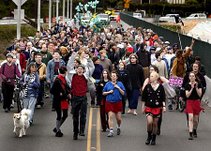[olympiaworkers] Guineans in post-massacre protest
Mon Oct 12, 2009
CONAKRY (AFP) – Shops, markets and offices were closed Monday in Conakry
and other cities after labour unions called on residents to stay home in
protest at the September 28 massacre which killed at least 150 people.
Little traffic ventured onto the streets of Guinea's capital two weeks
after elite troops opened fire on thousands of demonstrators protesting
military rule.
Banks and service stations were also shut in Conakry.
The union call received strong backing in the southeastern town of
Kissidougou. Local trader Sall Mamadou Lamarana told AFP by telephone
there was "no activity" in the main market. "All the shops, as well as the
banks, have shut down, and the bus station as well," he said.
In northwestern Boke, "there is no activity at the market. People have
been praying in the courtyards, and youth clubs," schoolteacher Sine
Magassouba said by phone.
In a statement issued last week, the main union federation called on
people to observe a "day of prayer", urging them to "kneel piously before
the mortal remains of the ... martyrs for democracy in Guinea," killed
when soldiers opened fire on the protest in a football stadium.
Rights organisations and the United Nations say that more than 150 people
were killed and 1,200 injured, while the junta led by Captain Moussa Dadis
Camara puts the death toll at 56.
The trade unions asked people to "observe two days of homage and
compassion and contemplation by way of protest and solidarity, on October
12 and 13."
"This means that all workers in the public, private and informal sector
are invited to stay at home to pray for the memory of those felled by the
bullets of the massacre of September 28," the secretary general of the
National Organisation of Free Trade Unions in Guinea (ONSLG), Yamodou
Toure, told AFP.
Schools were also closed, but the start of the new school year had in any
case been delayed until Thursday in the wake of the violence that rocked
the west African country.
On September 28, people defied a ban on protests to rally at the stadium
for a demonstration to urge Camara not to stand for president in elections
he has pledged to hold in January next year.
The killings began after presidential guard troops arrived in the stadium,
but Camara has denied responsibility and declared himself "very, very
sorry" for the slaughter.
The junta has been strongly condemned by the United Nations, the African
Union, the European Union, former colonial power France, the United States
and a slew of other countries.
On September 18, the African Union gave the junta and its leader Camara
one month to make a written commitment not to stand in the elections
scheduled for the end of January or face "appropriate sanctions."
AU commission president Jean Ping said Sunday on the sidelines of a
climate change forum in Ouagadougou that "the process is in hand," but
added that the AU would discuss "the nature of sanctions in liaison with
the international community."
Ping said the Economic Community of West African States (ECOWAS), meeting
Monday in the Nigerian capital Abuja, would decide what measures it wanted
to take against Guinea, which is a member state.
"We're working in tandem with ECOWAS," Ping added. "We need a joint stance
with ECOWAS."
ECOWAS commission head Mohamed Ibn Chambas last week met Burkina Faso
President Blaise Compaore, whom the regional body has appointed to mediate
on the Guinea crisis in the wake of the massacre.
Amid mounting international pressure on Camara, rights groups have also
reported many cases of rape and other abuses at the stadium.


No comments:
Post a Comment